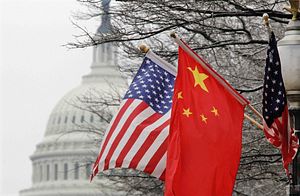U.S. President Donald Trump has accused China of seeking to interfere in the upcoming midterm elections, which will determine the balance of power in the U.S. legislature. Trump made the claim — without providing evidence or specifics — while chairing a session of the United Nations Security Council in New York.
“Regrettably, we found that China has been attempting to interfere in our upcoming 2018 election coming up in November against my administration,” Trump declared. He then offered an explanation for the supposed interference: “They do not want me, or us, to win because I am the first President ever to challenge China on trade.”
The accusation comes amid continued focus on Russian interference in the U.S. democratic process, both in the 2016 elections, which ushered Trump into the White House, and in the widely anticipated midterm elections. Notably, Russia is believed to have interfered in the 2016 election on Trump’s behalf; a closely watched Special Counsel investigation is attempting to determine the extent of that interference, and whether the Trump campaign itself was involved. China, on the other hand, is interfering on behalf of Trump’s opponent, according to the president.
When asked later to provide specifics, Trump declined, “suggesting that some of the material was classified,” according to the Washington Post. He then repeated the claim that “they [Chinese authorities] are trying to meddle in our elections and we’re not going to let that happen just as we’re not going to let that happen with Russia.”
China’s Foreign Minister Wang Yi, who was also in attendance at the UN Security Council session, refuted Trump’s claim. “We do not and will not interfere in any countries’ domestic affairs,” Wang said. “We refuse to accept any unwarranted accusations against China.”
The Washington Post cited a “senior Trump administration official” as explaining that China was stepping up efforts to silence critics of Chinese policy as well as supporters of Trump’s trade tactics. The official promised that more information would be released in the coming days, with Vice President Mike Pence set to give a speech on the topic next week.
Also on Wednesday, Trump took to Twitter to post a photo of an insert Chinese state-owned media company China Daily paid to have included in the Des Moines Register. Des Moines is the capital of Iowa, a state Trump won handily in the 2016 election, and where the farming community has been especially hard hit by the U.S.-China trade war. China placed tariffs on U.S. agricultural imports in response to the Trump administration’s own tariffs on Chinese goods – a fact the paid China Daily insert highlighted. “Duel undermines benefits of trade,” the largest headline on the first page of the insert declared.
“China is actually placing propaganda ads in the Des Moines Register and other papers, made to look like news,” Trump tweeted. “That’s because we are beating them on Trade, opening markets, and the farmers will make a fortune when this is over!”
A paid newspaper advertisement, though, does not rise to the level of what is typically meant by “interference” in an election. A Chinese Foreign Ministry spokesperson argued as much when asked about the advertisement, saying, “Many foreign media do that. It is absolutely far-fetched and fictitious to paint such normal cooperation as the Chinese government trying to interfere in the U.S. election.”
Despite Wang’s denial, there is evidence that China has tried to interfere in other country’s politics in the past. Most notably, Australia has accused China of “brazen” and “aggressive” attempts to influence Australian politics. In perhaps the most famous example, MP Sam Dastyari was accused of adopting pro-China stances on controversial issues such as the South China Sea after receiving donations from a Chinese businessman. Then-Prime Minister Malcolm Turnbull called the Dastyari case “as blatant an act of political interference that you could imagine.”
Such concerns pushed Canberra to enact new foreign interference laws that will, among other things, require foreign lobbyists to register and expand the definition of espionage. A separate law will ban foreign political donations.
There’s also a history of Chinese interference in U.S. elections. The Democratic Party was accused of accepting donations linked to the Chinese government during the 1996 elections, which saw Democrat Bill Clinton re-elected as president. A 1998 Senate report, the result of an investigation into the scandal, found that “strong circumstantial evidence that the Government of the People’s Republic of China (PRC) was involved in funding, directing, or encouraging … foreign contributions” to the Democratic Party. The Democratic National Committee was ultimately forced to return nearly $3 million in “illegal or improper donations,” although not all of this amount was linked to the Chinese government.
In 1996, just as in today’s Australia, critics said the overzealous quest to weed out Chinese interference resulted in the unfair targeting of naturalized citizens of Chinese origin. In one particularly egregious case linked to the 1996 political donations scandal, investigators subpoenaed the bank records of the wrong person, simply because he had a similar name to another Chinese-American suspected of making a fraudulent donation.
Given the history of Chinese attempts to influence foreign politicians, it’s wise to be on guard against future efforts. But Trump’s claim of Chinese election interference stands out for the lack of detail, especially given the wealth of information that has been released on Russian interference tactics.
The Trump administration official who spoke to the Washington Post seemed to suggest that China’s retaliatory tariffs would count as political “interference,” because they largely target businesses, including farmers, in areas that supported Trump in 2016. That, however, is a far cry from the sort of clandestine interference China has been accused of in Australia.

































